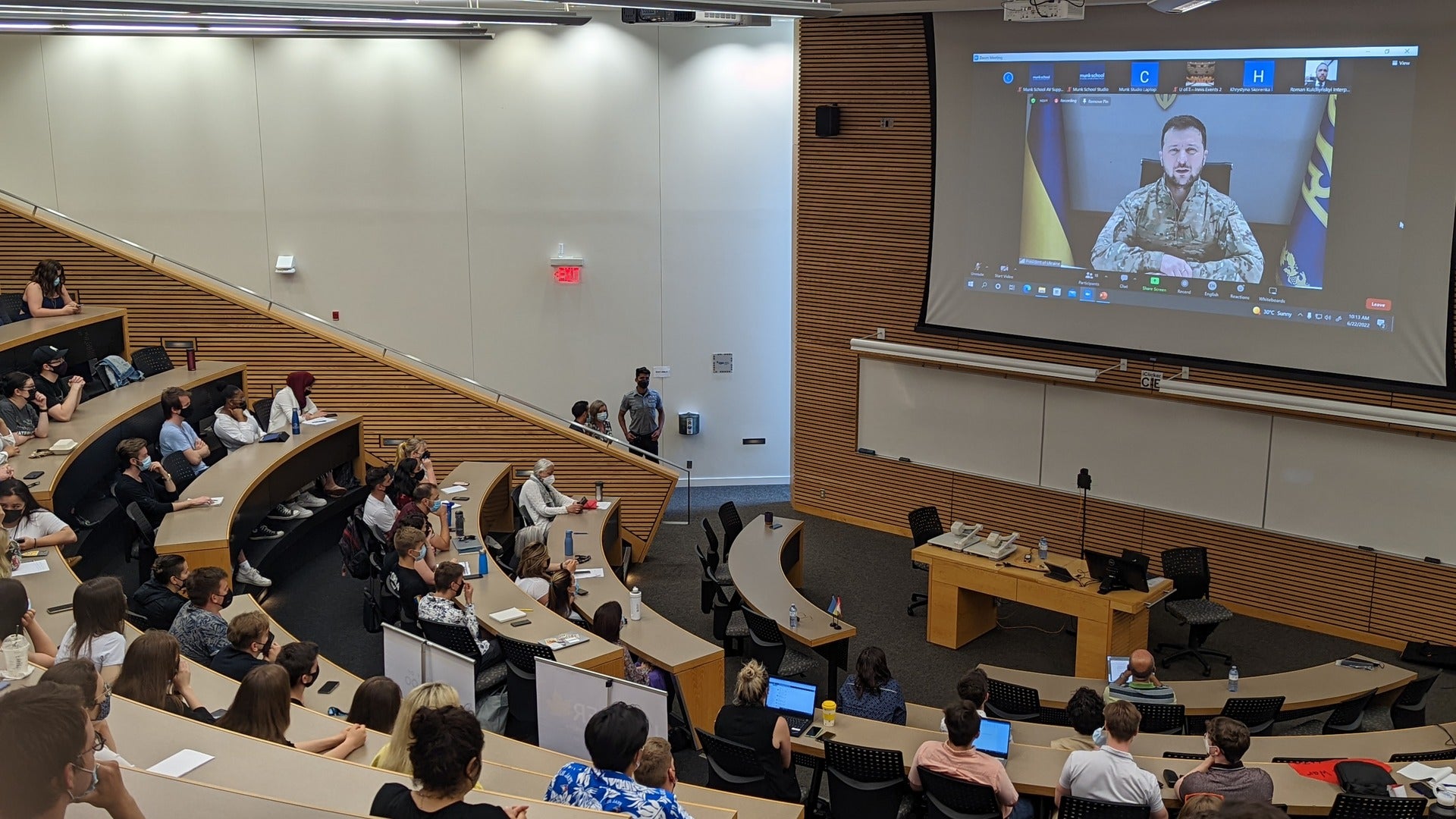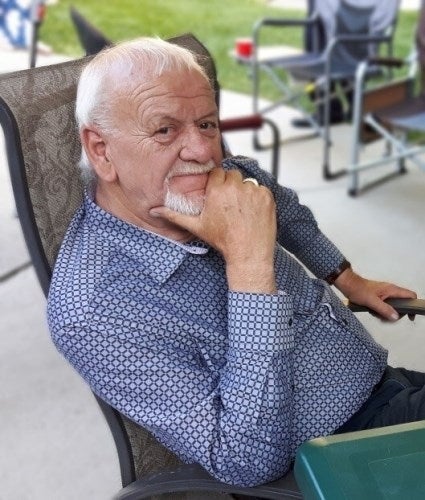Editor:
Brandon Sweet
University Communications
bulletin@uwaterloo.ca
President Volodymyr Zelenskyy addresses Canadian students

By Stephanie Longeway. This article was originally published on Waterloo News.
Ukraine’s fight against Russia’s invasion of their country is nearing its fourth month. University of Waterloo is unwavering in our solidarity with the innocent victims of this invasion, and we stand in support of those who are calling for its end.
On June 22, Waterloo students had the privilege of participating in a live virtual address from Ukraine’s President Volodymyr Zelenskyy. The Honourable Chrystia Freeland, Deputy Prime Minister and Minister of Finance and the University of Toronto's Munk School of Global Affairs and Public Policy, organized the address. The live feed was shared across Canada to eight Universities including Waterloo where the feed was streamed to more than 200 students from Waterloo and Wilfrid Laurier University in Hagey Hall. Along with the in-person events across Canada, more than 6,800 people tuned into the live stream on YouTube.
Freeland introduced President Zelenskyy and noted the important lesson Ukrainian is giving the world saying that “Ukraine is our teacher, and the rest of the world’s democracies are its students … They are teaching us that democracy is worth fighting for.”
President Zelenskyy joined the address via live stream from Ukraine and explained the impact the war is having on the everyday lives of Ukrainians. He stated that the goals and values he has for his country have not changed since he took office but says “the way we work and live is now different.” He reiterated that the war is about “fighting for our future and for our freedom.”
Mark Andre, a fourth-year history and political science student, said the address was a “once and lifetime experience. Two years ago, you would not have thought you’d be in a zoom call with the President of Ukraine. It was very moving.”
Another anonymous student added that “Zelensky is a source of strength and an example of what to do in a crisis. He is an inspirational person.”
Students from the in-person audiences were given the opportunity to ask President Zelenskyy questions. One student from the University of Calgary asked the President how he believed the internet and social media has changed the way the rest of the world is experiencing the war. President Zelenskyy explained that the internet is a powerful instrument in sharing the causalities and realities of war.
“I really liked that the questions came from across the country,” said Emilie Caron, a PhD student studying psychology at Waterloo. “The event really stood out because it was an interactive process with the president — not just him talking. It makes him more personable, and it makes you feel more connected to the cause while trying to understand what they’re going through while you’re sitting here all safe in Canada.”
“We are fighting for the same values of anyone living in the democratic world,” President Zelenskyy said.
“We are grateful to President Zelenskyy for taking the time to address our students during what is an unthinkably challenging time for him and his embattled nation,” says Vivek Goel, President and Vice-chancellor of Waterloo. “In this historic moment we’re proud to show our support to President Zelenskyy, and the brave people of Ukraine, who serve as a powerful example to our community of the courage it takes to defend democracy.”
Watch President Zelenskyy’s live stream:
Supporting students impacted by conflict
Last month, Waterloo welcomed 34 Ukrainian students whose university studies have been disrupted by the ongoing war. These internships are free to the students with funding being provided by on-campus and corporate sponsors.
Conflict happening in many regions around the world today. The University has launched a fund to support students whose education has been impacted by global war or conflict with the Ukrainian students as the immediate beneficiaries. Please consider donating to the Students At-Risk Fund.
The war in Ukraine: what's next?

By Sam Toman.
Next week, on Tuesday June 28th the grassroots group, University for Ukraine (#U4U). Is hosting a seminar titled: The War in Ukraine: What's Next? to raise awareness for the group’s humanitarian fundraising efforts.
The free in-person event seminar is open to all and will feature expert opinions on Russia’s war in Ukraine from professor Alexander Lanoszka from the Department of Political Science and Ivan (John) Jaworsky, a retired professor from the Department of Political Science at the University of Waterloo.
The event runs from 3:30 p.m. to 5:00 p.m. in STC 0020. No registration is required.
Professor Jaworsky will focus on the impact of the current war on the domestic situation in Ukraine, and Canada’s role in facilitating Ukraine’s eventual recovery from the war. Professor Lanoszka will discuss the international context of the war in Ukraine, and the implications of this war for international relations.
The seminar presentations will be followed by an open discussion with the audience.
The seminar and discussion will be moderated by professor Serhiy Yarusevych from Mechanical and Mechatronics in Engineering who has been involved in various University of Waterloo initiatives regarding Ukraine.
Those unable to attend the seminar can tune-in via Teams chat here. If you have any questions, please contact Serhiy Yarusevych at syarus@uwaterloo.ca.
Current hepatitis B prevention and treatment strategies are inadequate to meet Ontario's targets

A new University of Waterloo study shows that current Hepatitis B vaccination, screening, and treatment strategies in Ontario will leave the province well short of its goal to reduce preventable infections that afflict 1,000 Ontarians annually.
The report's authors developed a computer model simulating the long-term effects of existing Hepatitis B virus (HBV) prevention and treatment strategies in Ontario. "We found that even if current strategies were increased, Ontario would continue to struggle to eliminate new HBV cases and decrease liver-related deaths and HBV-induced cancers," said William W.L. Wong, a professor at Waterloo's School of Pharmacy and the study's lead researcher.
While there is a vaccine to prevent HBV and antiviral treatments to suppress the virus if the patient develops chronic (long-lasting) hepatitis B, vaccination, screening, and treatment strategies are often logistically challenging and expensive.
Several high-income countries, including Canada, have committed to achieving World Health Organization (WHO) goals to decrease new cases of HBV by 95 per cent and to decrease HBV-related deaths by 65 per cent by 2030.
"We found that existing HBV prevention and treatment strategies in Ontario would only decrease cases of acute hepatitis by 64.5 per cent, decrease HBV-related decompensated cirrhosis by 9.4 per cent and decreases liver cancer by 10.5 per cent between 2015 and 2030," Wong said. "However, the incidence of chronic HBV would increase by 26.6 per cent, and liver-related deaths would increase by one per cent in the same time frame."
The WHO recommends vaccinating children shortly after birth against HBV. In Canada, there is no universal birth-dose HBV policy. In many provinces, including Ontario, HBV vaccination is implemented for seventh-grade students.
"Policies like this can leave gaps, as young children have the highest risk of developing chronic hepatitis B if exposed to HBV," Wong said. "The computer model we've developed helps identify gaps like this."
The study's findings have implications for health policy, future drug development and even immigration. Currently, there is no treatment to completely cure HBV. The researchers feel new antiviral medications are needed to eliminate HBV.
"Additionally, countries like Canada, which receive immigrants from countries where HBV is prevalent, should consider how best to support these newcomers," Wong said. "Working with members of these communities, we can develop screening policies that do not lead to stigmatization or impact immigration opportunities, while also ensuring newcomers receive health-care support."
The study was a collaboration between University of Waterloo, University of Guelph and University Health Network in Toronto and was funded by Canadian Institutes for Health Research. The study was recently published in the Journal of Hepatology.
Maximizing co-op student hiring on campus
A message from Co-op and Experiential Education (CEE).
As you may know, the University is one of the top co-op employers and supporter of work-integrated learning. We hire numerous co-op students in a wide variety of roles across campus each term. As many co-op hiring managers have noticed, fewer students are applying to jobs on and off campus. It is a trend that is happening across all industries as we recover from the impacts of the pandemic. One way to help overcome the challenge of attracting student talent is to update your job descriptions and postings.
Students are available for hiring year-round with on-campus jobs receiving the largest number of applicants between cycle two and five. Visit our website for co-op work term dates and important recruitment dates. Check out these tips and job template for writing a job description for next gen talent to improve your on-campus hiring.
Remembering Colin Mayfield

This article was originally published on the Faculty of Science's website.
Past and present members of the Department of Biology are saddened to announce the passing of Professor Emeritus Colin Ivor Mayfield. He was with the University of Waterloo for more than three decades. Mayfield was one of Biology's pioneering faculty who helped establish microbiology as a strength of the University of Waterloo.
Mayfield joined the University of Waterloo in 1970 after completing his graduate studies at the University of Liverpool, UK and a post-doctoral fellowship at McGill. He worked at the University of Waterloo for more than 34 years and served as Associate Dean of Computing in the Faculty of Science for eight years.
"Colin was a wonderful, caring colleague, who had a true interest in others and was always willing to use his talents to help them," said Professor Emeritus John Thompson. "It was a privilege and honour to work with him."
His passion for learning, innate curiosity in biology and technology fuelled his diverse research interests and successful career. He had an H-index of 33 and published more than 160 academic papers.
His research began in soil microbiology and then moved onto soil nitrogen, aquatic microbiology and toxicology. That interest included bioremediation and groundwater microbiology. Later in his career he worked in the fields of information technology, environmental software development and cooperative projects in data management, sharing and application.
He noticed it was the lack of mechanisms to find and use environmental data and information that blocked progress in that sector, not just the lack of information. Government, industry and academia weren't able to find, share and use existing data on environmental issues. This insight shifted his interests and research towards environmental information systems.
Mayfield taught 74 graduate students during his career. He believed in the research potential of students, regardless of the strength of their transcript. That belief gave Joan Torrie the opportunity to pursue graduate work. Out of gratitude she developed the Waterloo Pioneers of Microbiology Award to honour those early faculty and pay it forward to an incoming students who may overlooked during the conventional scholarship and award selection processes.
"Colin's reputation as a graduate studies supervisor was notable in that many of his students felt he had faith in their ability to grow and contribute to science and that any path was open to them," said Karen Trevors, Executive Officer, Dean of Science. "He built a strong cohort of students who were supportive and loyal to one another and successful in academia, consulting, and entrepreneurial ventures."
Thursday's Notes
Warriors Custom Apparel Program begins June 22 and runs until July 13. Purchase customized team specific gear to get ready for the 2022-2023 season. Hoodies, Hats, Jerseys, T-shirts and more. Buy now!
The IBPOC Writing and Communication Workshops are spaces where graduate students identifying as Indigenous, Black, and people of color can come together to form a supportive community of writers. This is an intentional IBPOC-only virtual space. Join us today from 5:30 p.m.- 6:30 p.m. for our first IBPOC Writing and Communication Workshop, Writing Prompts. You can join the IBPOC writing groups channel through WCC’s Teams.
A Retirement Open House for Linda Beaulieu who has served at the university for 23 years, will be held today from 12:00 p.m. to 2:00 p.m. in E2-1772.
Link of the day
When and Where to get support
Students can visit the Student Success Office online for supports including academic development, international student resources, immigration consulting, leadership development, exchange and study abroad, and opportunities to get involved.
Instructors looking for targeted support for developing online components for blended learning courses, transitioning remote to fully online courses, revising current online courses, and more please visit Agile Development | Centre for Extended Learning | University of Waterloo (uwaterloo.ca).
Instructors can visit the Keep Learning website to get support on adapting their teaching and learning plans for an online environment.
Course templates are available within your course in LEARN to help you build and edit your content and assignment pages quickly.
The following workshops, webinars, and events are offered by the KL team (CTE, CEL, ITMS, LIB):
-
Scholarship of Teaching and Learning (SoTL) Methods – self-directed, continuous self-enrollment course in LEARN.
-
Independent Blended Course Design (iBlend) - self-directed, continuous self-enrollment course in LEARN.
-
Copyright Overview for Waterloo Instructors and Staff - self-directed, continuous self-enrollment course in LEARN.
-
Independent Remote Course Design Essentials (iReCoDE) - self-directed, continuous self-enrollment course in LEARN.
-
Supporting Student Mental Health (for Instructors) – self-directed, continuous self-enrollment course in LEARN.
-
SoTL Stories, Wednesday, June 15, 1:00 p.m. to 2:00 p.m.
-
Research & Reconciliation: Unsettling Ways of Knowing Through Indigenous Relationships: A Learning Circle Series (CTE7013), Thursday, June 16, 1:00 p.m.
Supports are available for employees returning to campus. Visit IST’s Hybrid Work and Technology guidelines and workplace protocols to assist with the transition.
The Writing and Communication Centre has in-person and virtual services to support grad and undergrad students, postdocs and faculty with any writing or communication project. Services include one-to-one appointments, drop-ins at Dana Porter Library, online workshops, writing groups, English conversation practice, and custom in-class workshops.
Co-op students can get help finding a job and find supports to successfully work remotely, develop new skills, access wellness and career information, and contact a co-op or career advisor.
The Centre for Career Action (CCA) has services and programs to support undergrads, grad students, postdocs, alumni, and employees in figuring out what they value, what they’re good at, and how to access meaningful work, co-op, volunteer, or graduate/professional school opportunities. Questions about CCA's services? Live chat, call 519-888-4047, or stop by our front desk in the Tatham Centre 8:30 a.m. to 4:30 p.m., Monday to Friday.
Drop-in to Warrior Virtual Study Halls on Wednesdays from 5:30 p.m. to 7:00 p.m. Come together in this virtual space to set goals and work independently or in groups each week.
Renison's English Language Institute continues to offer virtual events and workshops to help students practice their English language skills.
If you feel overwhelmed or anxious and need to talk to somebody, please contact the University’s Campus Wellness services, either Health Services or Counselling Services. You can also contact the University's Centre for Mental Health Research and Treatment. Good2Talk is a post-secondary student helpline available to all students.
The Library is open with expanded hours for access to book stacks, drop-in individual study space, bookable group study rooms, drop-in access to computers and printers, book pick-up services and IST Help Desk support. Librarian consultations, Special Collections & Archives and the Geospatial Centre are available by appointment. Full details on current services and hours are available on the Library’s COVID-19 Update webpage.
The Faculty Association of the University of Waterloo (FAUW) continues to advocate for its members. Check out the FAUW blog for more information.
The University of Waterloo Staff Association (UWSA) continues to advocate for its members. Check out the UWSA blog for more information.
The Sexual Violence Prevention and Response Office (SVPRO) supports all members of the University of Waterloo campus community who have experienced, or been impacted, by sexual violence. This includes all students, staff, faculty and visitors on the main campus, the satellite campuses, and at the affiliated and federated Waterloo Institutes and Colleges. For support, email: svpro@uwaterloo.ca or visit the SVPRO website.
The Office of Indigenous Relations is a central hub that provides guidance, support, and resources to all Indigenous and non-Indigenous campus community members and oversees the University's Indigenization strategy.
The Waterloo Indigenous Student Centre, based at St. Paul’s University College, provides support and resources for Indigenous students, and educational outreach programs for the broader community, including lectures, and events.
WUSA supports for students:
Peer support - MATES, Glow Centre, RAISE, Women’s Centre - Visit https://wusa.ca/services/wusa-peer-support to book an appointment either in person or online for the Fall term.
Food Support Service food hampers are currently available from the Turnkey Desk 24/7 in the Student Life Centre. Drop off locations are also open again in SLC, DC, DP, SCH and all residences.
Co-op Connection all available online. Check https://wusa.ca for more details.
Centre for Academic Policy Support - CAPS is here to assist Waterloo undergraduates throughout their experience in navigating academic policy in the instances of filing petitions, grievances and appeals. Please contact them at caps@wusa.ca. More information is available.
WUSA Student Legal Protection Program - Seeking legal counsel can be intimidating, especially if it’s your first time facing a legal issue. The legal assistance helpline provides quick access to legal advice in any area of law, including criminal. Just call 1-833-202-4571.
Empower Me is a confidential mental health and wellness service that connects students with qualified counsellors 24/7. They can be reached at 1-833-628-5589.
GSA-UW supports for graduate students:
The Graduate Student Association (GSA-UW) supports students’ academic and social experience and promotes their well-being.
Advising and Support - The GSA advises graduate students experiencing challenges and can help with navigating university policies & filing a grievance, appeal, or petition.
Mental Health covered by the Health Plan - The GSA Health Plan now has an 80 per cent coverage rate (up to $800/year) for Mental Health Practitioners. Your plan includes coverage for psychologists, registered social workers, psychotherapists, and clinical counselors.
Dental Care - The GSA Dental Plan covers 60 to 70 per cent of your dental costs and by visiting dental professionals who are members of the Studentcare Networks, you can receive an additional 20 to 30 per cent coverage.
Student Legal Protection Program - Your GSA fees give you access to unlimited legal advice, accessible via a toll-free helpline: +1-833-202-4571. This advice covers topics including housing disputes, employment disputes, and disputes with an academic institution.
The Graduate House: Open Monday to Tuesday 11:30 a.m. to 7:00 p.m. and Wednesday to Friday 11:30 a.m. to 9:00 p.m. We’re open to all students, faculty, staff, and community members. The Graduate House is a community space run by the GSA-UW. We’re adding new items to the menu. Graduate students who paid their fees can get discounts and free coffee.
When and Where (but mostly when)
Warriors vs. Laurier Blood Donation Battle. Join our “Waterloo Warriors” team on the Blood.ca website or app. #ItsInYouToGive
CIHR Commercialization (CMZ) Peer Review Committee Information Session, Thursday, June 23, 12 noon to 1:30 p.m., Zoom. Speaker: Dr. Kathleen Marsman, Chair of CIHR CMZ Peer Review Committee. Registration required.
Retirement open house for Linda Beaulieu, Thursday, June 23, 12 noon to 2:00 p.m., E2-1772.
Evolutions through Graduate School and Hamiltonians, Thursday, June 23, 2:30 p.m.
Susan Aglukark: Nomad-Correcting the Narrative, Thursday, June 23, 6:00 p.m.
Lecture and Workshop with Visiting Researcher Georg Marschnig, Universität Graz, Tuesday, June 28, lecture from 3:00 p.m. to 4:00 p.m., “’Du host lai oin hoimat’ Memories and Identities of German speaking Migrants in Canada, the US and Europe" and workshop from 4:00 p.m. to 5:00 p.m., “www.erinnerungslandkarte.at- An online Plattform for Austrian Memorial Sites for Victims of National Socialism”, HH373.
Entrepreneurial Ph.D. Fellowship Information Session Wednesday, June 29, 12 noon to 1:00 p.m., Conrad School or Zoom. Registration required.
NEW - Warriors Youth Summer Day Camps, July 4 to September 2. Open to boys and girls age 5-18. Baseball, Basketball, Football, Hockey, Multi-Sport and Games & Volleyball. Register today.